|
|
|
Roger Moore
Datastream
Full Name: Roger George Moore
Date of Birth: 14th October 1927
Place of Birth: Stockwell, London, England
Height: 6' 1" (1.85m)
Also Famous For: The Saint, Cannonball Run
Films: 7
Active Duty: 1972-1985
Only Bond: To have worked under contract
with MGM before taking the role of 007
Bondography
1973 - Live and Let Die
1974 - The Man with the Golden Gun
1977 - The Spy who Loved Me
1979 - Moonraker
1981 - For Your Eyes Only
1983 - Octopussy
1985 - A View to a Kill
"To me, the Bond situations are so ridiculous, so outrageous. I mean, this man is supposed to be a spy and yet, everybody knows he's a spy." |
|
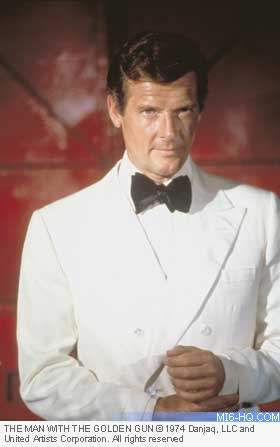 |
Biography
Roger George Moore was born to George and Lillian Moore
on October 14, 1927. Moore's father was a respected constable in
the Bow Street police force and sent his only child, Roger, at
first to attend Hackford Road Elementary and later to Battersea
Grammar School. Some of Moore's earliest memories were of his Uncle
Jack - a British soldier and hero among the family. When the
World War II threatened London families, Moore and his mother were
evacuated from the city. Moore excelled academically, receiving
top grades and was keen swimmer - however his real passion as a
schoolboy was the arts. Moore enjoyed drawing and painting and
had resolved to pursue a career as an artist.
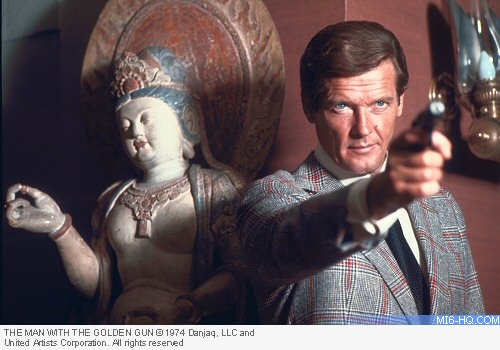 |
When, at the young age of 15, Moore left the
education system, he earned a job at a local animation house
that were making films to promote the War effort. Moore's responsibilities
were as a tracer and filler-in at Publicity Picture Productions,
which had offices in D'Arblay Street, London. While his tenure
as an animator's assistant was short, he did gain the opportunity
to become a member of the ACTT - of which he is still a member
to this day. The young artist was paid £3.50 per hour for
his duties before an unfortunate error saw Roger Moore fired from
this role.
After this small setback, Moore took the opportunity
to work as an extra for a variety of local film and television
companies, including Caesar and Denham Studios. On the set of
the Vivien Leigh "Caesar and Cleopatra" Moore was introduced
to director Brian Desmond Hurst who encouraged him to enrol
in RADA (The Royal Academy of Dramatic Arts) and offered to pay
for Moore's tuition as an actor, should he get into the performer's
college. Through his work at RADA, Moore landed a handful of
bit parts on stage in the West End, before the draft halted his
training.
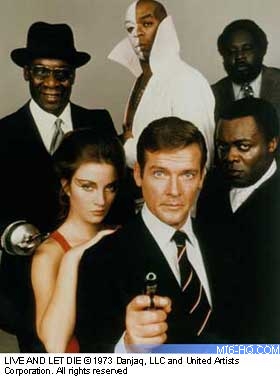 |
|
At age 18, Moore was
enlisted to the services as a 2nd Lieutenant but was
eventually promoted to Captain. For a short period he
was posted to West Germany before transferring to the
entertainment branch, which better suited his tastes.
When allowed leave from the Army Service Corps
in 1946,
Moore returned to England and was married to his
first wife and RADA classmate, Doorn van Stwyn, in a
small ceremony in Wandsworth. When his commitment to
the Army was up, Moore returned to London in order to
pursue his life-long dream in the arts. He worked on
radio, as a model, onstage and even as a salesman in
order to pay the bills. Moore gained a reputation modeling
for printed knitwear advertisements and earned the facetious
nickname "The Big Knit".
In 1949, Moore landed the opportunity
to tour with a theatre troupe, however the extended periods
away from home were putting a strain on the young couple's
marriage. Moore had bigger ambitions of becoming a full-time
screen actor and eventually his marriage with Doorn fell
apart, ending in divorce in 1953.
|
Moore made his first television appearance in
a one-off 1950 feature "Drawing Room Detective". During
this period he attended a party at the singer Dorothy Squire's
home. Both Squire and Moore were awaiting divorce settlements
but the pair made a connection and when the legalities were over,
Roger accompanied his new lady friend to the US on a promotional
tour of her newest record.
In the Americas, Moore
was offered various contracts with big studios including
Fox and Columbia but after some advice, selected an offer
from MGM, which allowed him the most flexibility and the
chance to live and work in New York a while longer. His
first production with MGM came in the form of Elizabeth
Taylor's "The Last Time I Saw Paris", which saw
him return to the UK for filming in 1954. He performed
a few minor roles in MGM-made pictures but none brought
fame
or financial success for Moore. In 1956, he worked opposite
Lana Turner in "Dianne" - his final picture in
the contract with this studio.
Moore's first bout of fame arrived when
he earned the title role in television adventure "Ivanhoe",
which first aired in 1958. He starred in 39 episodes of
the series before moving on to the next swashbuckling adventure.
1959's "Maverick" saw Moore play the lead character
once again: Beauregarde Maverick, the "cousin" of
James Gardner's popular character. During shooting in Italy,
in 1961, Moore's relationship with musician Squire fell
apart, however the strong-willed woman refused him a divorce
until 1968. Moore claimed that it was love-at-first-sight
when he met actress Luisa Mattioli on set. |
|
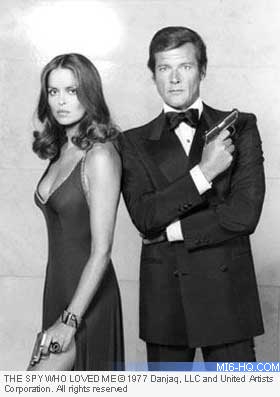 |
From one hero to the next, Moore was offered
the role of Leslie Charteris' charming character, Simon Templar.
Made by a British crew but with the intention of appealing to
the American market, "The Saint" first aired in 1962
- making Roger Moore a household name both in the UK and USA.
As this debonair and charming character, Moore established a
pattern he would later bring to a light-hearted version of the
James Bond character.
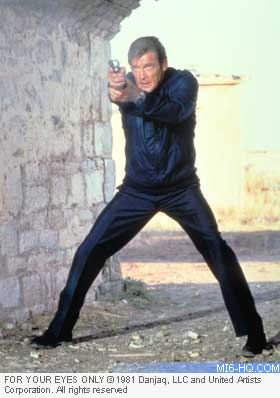 |
|
The pulpy series ran for seven years and over 100 episodes, however towards the end of the run, Moore was growing tired of the role and eager for his contract to end.
In 1969, Roger and Luisa were married
after having two children, Deborah and Geoffrey. The same
year, free of his commitment to "The Saint",
he made "Crossplot" closely followed by "The
Man Who Haunted Himself" and teamed up with Tony Curtis
to produce ITV's "The Pursaders!" (1971). It
was on the set of "The Pursaders!" that Moore
was urged by Tony Curtis to give up his smoking habit and
after a lecture from the American actor, Moore quit for
good.
"Of course I do not regret the Bond days, I regret that sadly heroes in general are depicted with guns in their hands, and to tell the truth I have always hated guns and what they represent." |
Fleming was
rumored to have brought up Moore's name as a suggestion for James
Bond when casting "Dr. No",
however Moore was viewed as "young looking" despite being
older than Sean Connery. In the end,
Moore made his debut older than his predecessor, Connery. His first
Bond production was "Live And
Let Die" (1973),
where he created a lighter, more tongue-in-cheek and English
gentleman-spy James Bond. Just prior to shooting on the eighth
007 adventure, Mattioli gave birth to Moore's second son, Christian.
He remained
the owner of the famous Tuxedo for 12 years, although considered
stepping down after his original contract expired after "For
Your Eyes Only". He was coaxed back by the producers for
a few more outings before making a definitive decision to hang
up the PPK on December 3rd 1985, shortly after his seventh Bond
outing, "A View To A Kill".
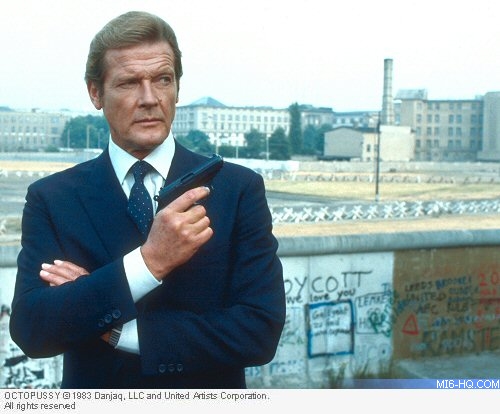 |
"I do not have time
to sit down and regret anything although sometimes I wish
I had been able to see more of my parents while they were
alive and have done more for them."
In between Bond productions,
Moore made a variety of movies, most notably "The
Cannonball Run", a racing adventure in which Roger
sent up his 007 persona and shared screen time with the
likes of Burt Reynolds and Dean Martin.
Post Bond, Moore's schedule
calmed somewhat, making a token few films during the
1990's - many of which scored lowly at the box office.
He kept
up his public image hosting award shows and appearing
on talk show panels but the acting work was slim. In the
early
'90s, Moore took on the prestigious role of UNICEF's
Goodwill Ambassador - to promote and encourage the work
of this charity. Up until 1991, and Moore's succession,
the role was that of glamorous film star Audrey Hepburn.
In 1996, Moore ended his 26 years of marriage to Luisa
Mattioli after some troubling times.
For his efforts to charity, Moore was
dubbed Commander of the Most Excellent Order of the British
Empire (CBE) in 1999 and later received the title Knight
of the British Empire, (KBE) at the 2003 Queen's birthday
honours list, making the legendary actor Sir Roger
Moore. On March 10th 2002, Sir Roger married his fourth
wife Christiana Tholstrup and the couple remains together
today. |
|
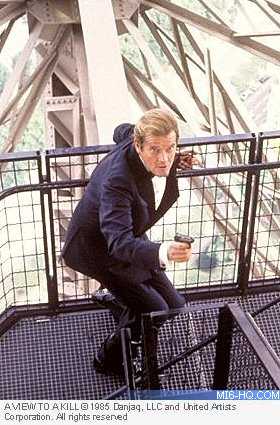 |
- World Film Male award at the 1980 Golden Globes
- Most Popular International Performer at the
1980 Academy of Science Fiction, Fantasy and
Horror Film Awards
- Won a 1973 Bambi (German television award)
- Best Actor at the 1967 Ondas Awards
|
|
|
Biographies
- My Word Is My Bond - Roger Moore - Buy
Now
- Roger Moore: His Film and Career - Gareth Owen, Oliver
Bayan - Buy
Now
|
|
|
|